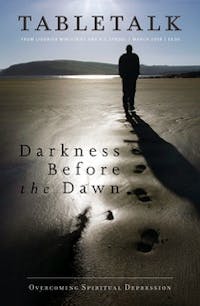
Request your free, three-month trial to Tabletalk magazine. You’ll receive the print issue monthly and gain immediate digital access to decades of archives. This trial is risk-free. No credit card required.
Try Tabletalk NowAlready receive Tabletalk magazine every month?
Verify your email address to gain unlimited access.
There is real poverty in the world, more than we would care to admit. Jesus, after all, told us that the poor would always be with us. But just as all Israel are not Israel, so all the poor are not truly poor. The true poor are those who on a given day face the real prospect of not being able to produce more calories than they consume. They are the truly hungry, the truly naked, the truly thirsty. They are not, on the other hand, those who buy store brand cereal, purchase their clothes at the local Goodwill store, or who can’t afford a daily sugar and bitter beans concoction from the local Starbucks.
The faux poor are those who merely feel poor. This feeling creeps upon us when we find a gap not between how many calories we consume and how many we burn, but between the lifestyle we believe is our due and the lifestyle our production allows. Or to put it more simply, feeling poor is the result of wanting more than we have more often than wanting more than we need. It matters not whether we measure our wages in thousands or billions. What matters is the gap.
The Christian, of course, ought never to go through this hardship. First, we are called to daily ask God for our bread. We are to ask confident that our Father will not give us a stone. We know that we have what we have not because of chance, but because our God reigns. More important still, even if we are not given sufficient calories to make it to the next day, we have been given the pearl of great price. Christians are the richest of all.
Jesus reminds us in the Sermon on the Mount to consider the lilies of the field. We are not to be anxious about what we will eat, what we will drink, or what we will wear. The Gentiles, Jesus tells us, seek after these things. But we are called to seek first the kingdom of God and His righteousness. And all these things will be added to us. The point here isn’t that the Gentiles get all the good stuff, while we have to learn to be satisfied with abstract things like the kingdom of God. Jesus is instead expressing the answer to Augustine’s problem: “Our hearts are restless, O Lord, until they find their rest in Thee.” Jesus is telling us to store treasure in heaven, which is the only treasure that satisfies.
In light of this, we ought not be surprised at the depression that weighs down the world around us. They are spiritually poor, rather than poor in spirit. That is, they have nothing of value. Their accumulated stuff amounts to striving after the wind. They miss that they deserve nothing. They miss that all that they have has been given through the common grace of God. (We simply have to find better language for this reality. It is true enough that this grace is given to all men, that He causes the rain to fall on the just and the unjust. It is true in turn that this grace isn’t as astonishing as the grace He gives to His elect. But it is still amazing grace. God is shockingly, not commonly, good to His enemies.) They look at the world as a random collision of time, space, and energy, and so see what they do have as an accident. They can no more give thanks for the food on their table than they can for the rain that falls. The bankruptcy of naturalism isn’t that it displaces the dignity of man, but that it destroys our ability to give thanks. Remember how Paul sums up the universal problem of the sinfulness of man: “For although they knew God, they did not honor him as God or give thanks to him” (Rom. 1:21).
What separates the seed of the woman and the seed of the serpent isn’t that the former receive the grace of God while the latter do not. The difference is that the former have been given this grace — the ability to give thanks to God for all that He has provided. This in turn directs us toward the cure for our own spiritual depression. We do not need to have our circumstances changed. We do not need another lecture on sound thinking. What we need is to give thanks.
This in turn is how we wage war against the seed of the serpent. The weapons of our warfare are not carnal, but spiritual. Is there anything more spiritual than a heart filled with gratitude to God? Is there anything more potent than joy? Is there anything greater than love? This is the day that the Lord has made. Let us rejoice and be glad in it. As we do so we will change our souls. As we do so we will change our families. As we do so we will change our churches. As we do so we will change the world. If we seek first the kingdom of God and His righteousness, the good news isn’t that all these things will be added to us. The good news is that we will find the kingdom of God and His righteousness. And having found this, we have found joy at His right hand forevermore.
